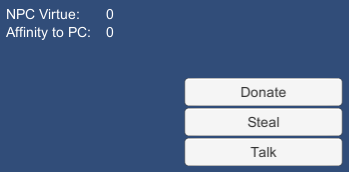Hi,
Here's an example scene:
LH_DS_PersonalityExample_2021-06-25.unitypackage
It looks like this:

- lhDSExample.png (5.77 KiB) Viewed 4944 times
The scene has two characters/factions: Player and NPC. The faction database has a single personality trait: Virtue.
The NPC has a script that manages the text in the upper left.
If you click the Donate or Steal buttons, they'll make the Player's DeedReporter report a deed to the NPC. The NPC is kind of a blank slate with good affinity to the Player, so anything the Player does will strengthen affinity.
The NPC also has 100% impressionability. If you click Donate, a deed with high Virtue, the NPC's Virtue will be influenced to increase accordingly. The first time you click Donate, the impression will just be ramping up, so the number won't be noticeable. However, with subsequent clicks you'll see the number go up. Similarly, if you click Steal, the number will go down.
The Talk button, will start a conversation. You can choose from three responses: Donate, Steal, and Teach About Virtue. Donate and Steal work like the UI buttons except they use a Lua function. The third response's Script field manually increases the NPC's Virtue using Lua functions. (I didn't type any Lua functions. I clicked the Script field's "..." button and chose them from the Custom submenu in the dropdown menu.) The third response also uses a sequencer command to tell the NPC's script to update the text.
If you have questions about how any of it is set up, just let me know. I threw the example together pretty quickly and didn't add comments to the short scripts. If any of it isn't clear, let me know.